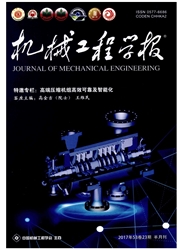

 中文摘要:
中文摘要:
围绕异构模块型可变形机器人在狭窄环境的通过性问题,在分析直线构型转向性能和狭窄环境安全通过范围的基础上,提出一种基于能量最优的狭窄环境下转向控制方法.首先在转向运动学和转向动力学模型基础上,构建了状态角度、驱动速度等控制参数与转弯半径等转向性能的关系;进而以能量消耗最小为目标、以安全转弯范围为约束条件,优化机器人直线构型转向下各运动参数的选择和调整.最终通过仿真分析验证了运动控制参数对转向性能的影响,并提出了不同转向方式、不同转向控制参数的特点和优势.
 英文摘要:
英文摘要:
Aiming at the capability of passing through a narrow space for a transformable robot with heterogeneous modules, a control method for steering in a narrow space is proposed on the basis of the optimal energy-consumption through analyzing the steering performance in line configuration and the safe range in narrow space. The kinematic and dynamic models for robot steering in line configuration are established, and then the relationship between steering performance and control parameters such as the configuration angle and driving velocity is constructed. With the goal of minimal energy- consumption, the kinematic parameters of steering in line configuration are selected and adjusted under the constraints of safe steering range. The influence of the motion control parameters on the steering performance is verified by simulation, and the features and advantages of various steering methods and steering control parameters are presented.
 同期刊论文项目
同期刊论文项目
 同项目期刊论文
同项目期刊论文
 期刊信息
期刊信息
